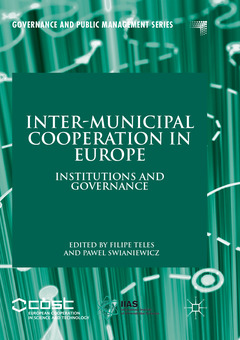Inter-Municipal Cooperation in Europe, 1st ed. 2018 Institutions and Governance Governance and Public Management Series
Coordonnateurs : Teles Filipe, Swianiewicz Pawel

Offers a comprehensive comparative study of the different aspects of the governance capacity of Inter-municipal Cooperation (IMC)
Examines decentralisation, multilevel governance and local government reform issues associated with IMC
Fills a lacuna in current scholarship by analysing the rise of IMC in under-researched country contexts
Date de parution : 09-2018
Ouvrage de 354 p.
14.8x21 cm
Disponible chez l'éditeur (délai d'approvisionnement : 15 jours).
Prix indicatif 137,14 €
Ajouter au panierDate de parution : 11-2017
Ouvrage de 354 p.
14.8x21 cm
Disponible chez l'éditeur (délai d'approvisionnement : 15 jours).
Prix indicatif 137,14 €
Ajouter au panier


